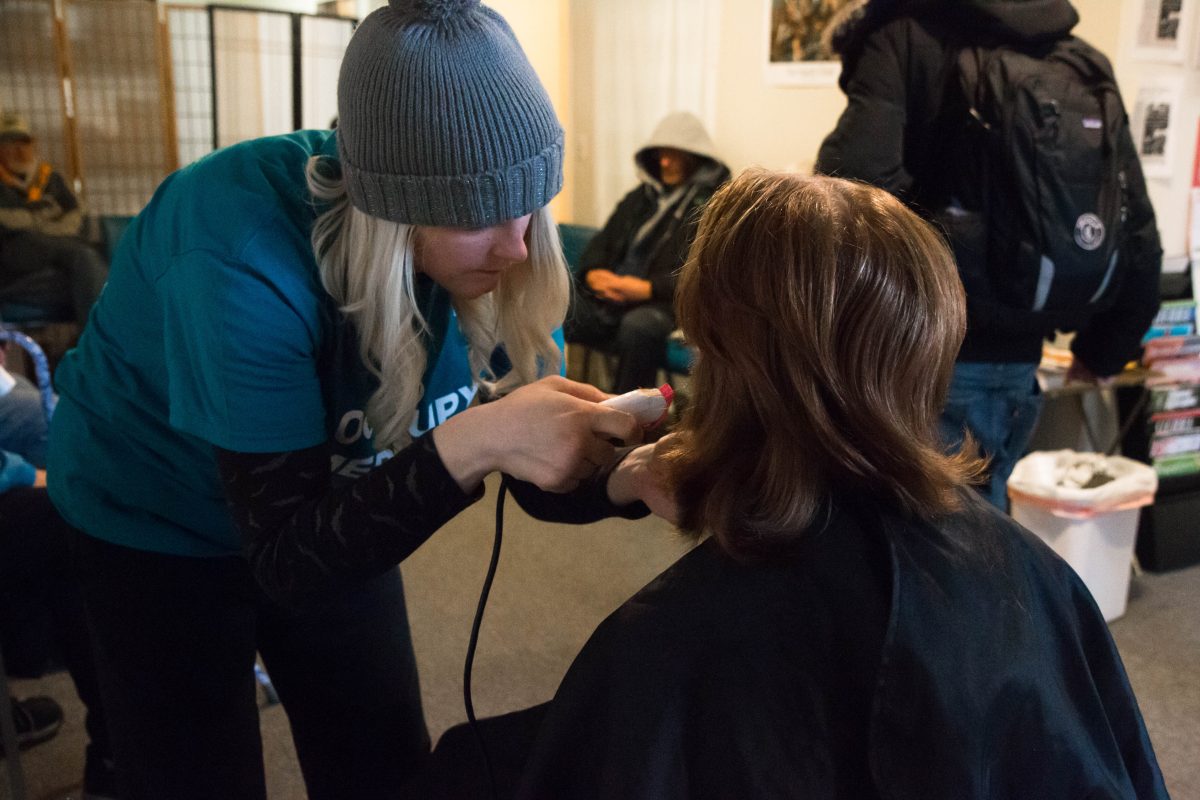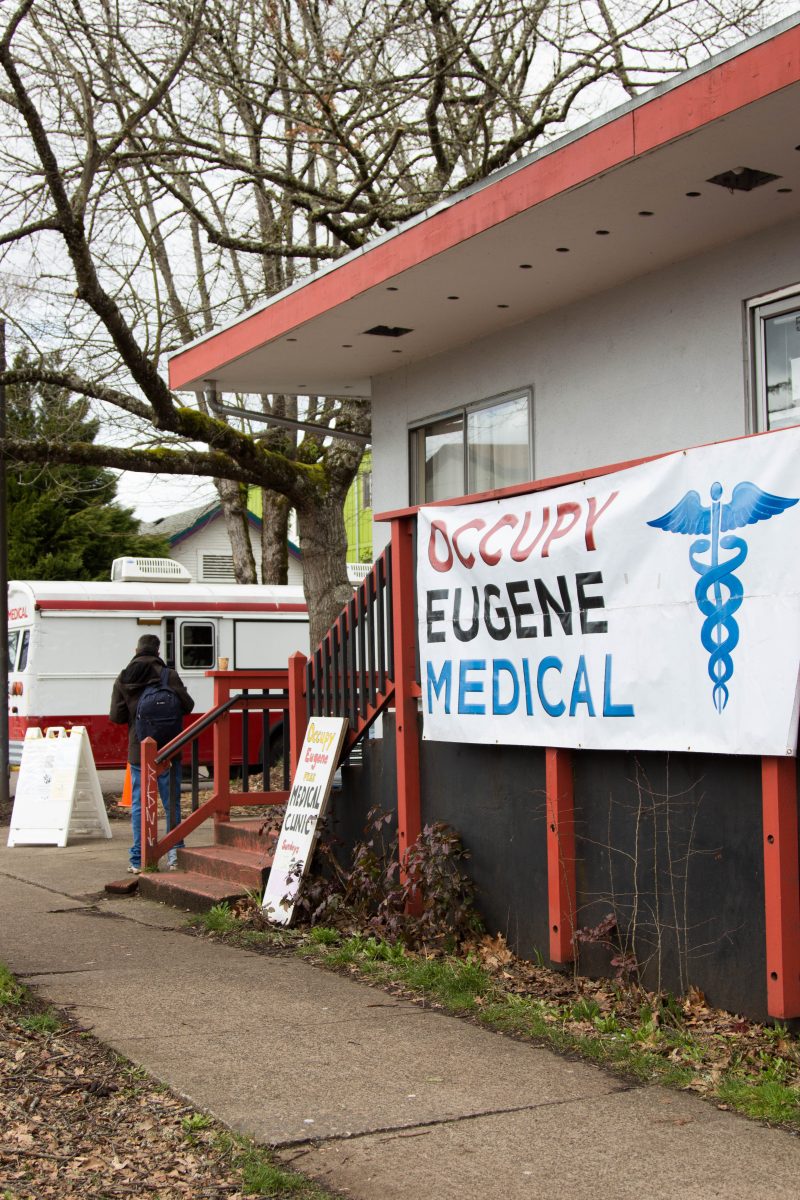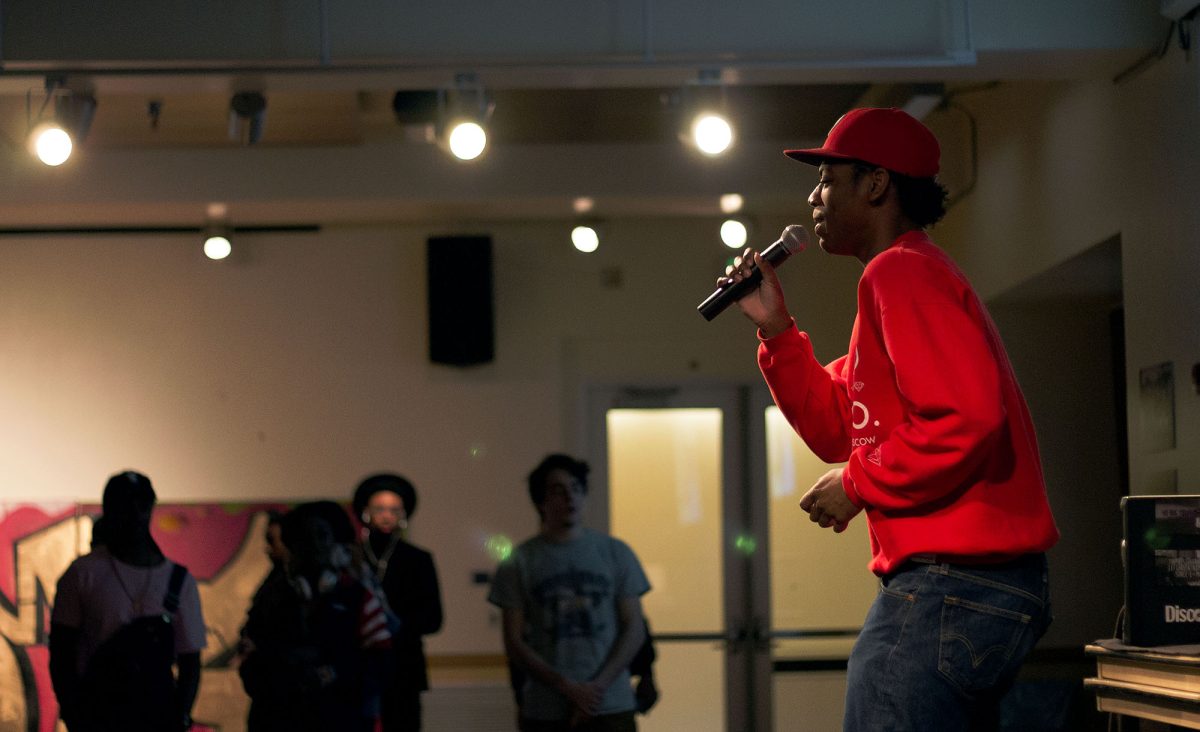Words by Claire Rischiotto, Photos by Hetta Hansen
[dropcap]O[/dropcap]n an overcast Sunday afternoon, Sue Sierralupé begins her volunteer shift by checking on a patient whose yellow and white skin is peeling off his right leg. She is the clinic manager and co-founder of Occupy Medical, a clinic that provides free medical and mental health services in Eugene, Oregon. The patient’s name is John and he is a 54-year-old man living on the streets of Eugene.
Today, John, who prefers to not share his last name, sits in a metal chair and soaks his feet in two white buckets full of yellow water. Below his red discolored right knee is a layer of hanging skin and open red ulcers, ranging from 1 centimeter to about 5 centimeters. One ulcer is shaped like an upside down red-veined fish.
Surrounding him in the rectangle shaped room is a team of three nurses inspecting the red ulcers on his right leg. Pam Garrison, one of the wound care nurses, explains that the white buckets are the tallest her team has access to. So Garrison has to improvise; she cups her hands in the yellow water and pours the liquid over John’s wounds to wash off the dead skin.
“The idea is we are showing a patient what it’s like to just come in and get care because you need it; not because you can afford it.”
In the middle of February, John’s right leg was acting up again because of his disorder, called chronic venous stasis insufficiency — an ulcer condition. When John went to PeaceHealth Hospital in Springfield he was given standard wound care: his leg was cleaned and bandaged. Then he was discharged and sent back outside at around two in the morning. With no transportation accommodation from the hospital, he says, he had to walk back to Eugene. He explains that he would have only received more medical care if his leg was septic — meaning if it was infected.
“He knows what to do. But he can’t do it. That’s the frustrating part for us,” Garrison says. “This is a common thread here, that people come out of hospitals and they know what to do and they can’t do it because of the way the system is set up. When they go to the overnight shelters they have to be out of there at seven in the morning and they don’t open until six in the evening. And all day they have to wander.”
This lack of adequate and affordable healthcare is the very reason Occupy Medical Clinic opened five years ago in downtown Eugene.
Every Sunday, from noon to 4 p.m., Occupy Medical, a 501(c)(3) nonprofit, operates out of a school bus-turned-clinic on wheels and a grey and red square building at 509 E. 13th ave. The clinic runs solely on the physical and monetary donations from the local community. The staff is made up of volunteers, registered nurses, physicians, medical students, mental health counselors, herbalists, and lunch servers. This allows Occupy Medical to treat any walk-in patient regardless of insurance or income. Though the clinic is open to anyone, many of the patients are homeless.
In Eugene, according to the Lane County Human Services Annual Homeless Point in Time Count, there are at least 1,451 homeless people in Lane County. That is 1,451 people who likely need access to healthcare. The clinic is set up to demonstrate what a single-payer healthcare system could look like, Sierralupé explains. This is where the state government provides the funds through taxes rather than insurance companies covering medical and mental health costs according to the American Medical Student Association, a student physicians in-training activism organization.
For Sierralupé, it’s straightforward as to why she does this work through Occupy Medical. “There is a need,” Sierralupé says. “I am tired of watching people die or suffer when I know that the problem is the way that we are doing billing.”
According to Sierralupé, the issue is that capitalism and healthcare don’t work well together. Instead, it results in an unfair medical treatment toward the poor. “Patients should not be treated like commodities and when they are that’s when you have that cost analysis of what it takes to treat people and they shouldn’t be guinea pigs,” she says.“I mean these are my neighbors. These are my friends. Why wouldn’t I do it.” This is why Sierralupé leads by example for the change she wants to see. This is the only way she knows how to change the system.
John’s story about having to wait until Sunday to go to Occupy Medical Clinic for more care for his leg is not an uncommon medical experience among the homeless in Eugene. And it is not the worst Sierralupé or Garrison have seen at Occupy Medical. In late December of 2016, in the same room where John is being treated, a young homeless man rolled around on the ground screaming in pain. The young man, whose name Occupy staff do not have permission to share, was suffering from frostbite.
“He was in so much pain that some of our staff was crying,” Garrison says. “We, at the time, knew he was going to lose his toes and part of his feet. He didn’t [know this]. It’s not a common thing unless you are taking care of the homeless.”
On January 23, 2017, Sierralupé shared this young man’s story at a Eugene City Council public forum. In the winter of 2017, the young homeless man was kicked out of a Riverside camp by Eugene Police in the middle of the night. After packing his backpack and leaving the campsite, he made it to the bike trail and then started to seize. While seizing on the ground, his poorly tied shoes came off and his feet remained exposed, until he was found the next morning. After he was sent to the hospital, all ten of his toes were amputated. He was given antibiotics and sent back to the streets.
“It took one night to do that,” Sierralupé says.
This March, Occupy Medical will have to relocate, yet again. With or without a building, Occupy Medical will continue to operate. The volunteer staff is dedicated to their patients and their fellow community members. Sierralupé and fellow Occupy Medical volunteers say they will continue to fight to make sure their patients receive basic needs of care. Sierralupé points out that the local Eugene community recognizes there is a need to provide basic services and resources to the homeless in Eugene. It’s because of Eugeneans’ donations that anyone can come to Occupy Medical and not have to pay for the care.
“The idea is we are showing a patient what it’s like to just come in and get care because you need it; not because you can afford it,” Sierralupé says. “It’s a different way to do healthcare.”















